This Kolkata Startup Replaced 6 Million Plastic Boxes — And Built a Rs 2 Crore Business Doing It
At a time when the world is starting to reckon with the environmental cost of plastic, one industry stands out for its overdependence on it. From takeaway meals to food storage, plastic has been the go-to material for packaging in the food sector. Initially seen as a convenient solution, it has now morphed into a global crisis. It leaches harmful chemicals into our food, piles up in our oceans, and creates mountains of waste that will outlast us by centuries.
As we face the devastating consequences of this plastic overload, the question is no longer if we can change, but how fast we can begin. One Kolkata-based company is stepping up to bring about that change. Pepcom Private Limited is replacing single-use plastic with eco-friendly, paper-based packaging that is just as effective but far safer for both the environment and the food industry.
“We wanted to solve a problem that affects both the environment and human health. Plastic packaging is harmful, but the food industry needs practical solutions. We needed to create something that worked and was safe, sustainable, and effective for the industry,” says Sagnik Mukherjee (38), the company’s founder and CEO. Sanjoy Banerjee, a close neighbour and long-time friend, also decided to join hands with him.
From boardrooms to green dreams: How two professionals decided to take a step
Before starting their packaging startup, the co-founders had spent decades in different corporate roles. Sagnik worked at Mahindra Automotive Sales & Service for around 17 years, while Sanjoy was at Hero MotoCorp. Even though they were successful in their respective careers, they were always deeply concerned about the environment. During the COVID-19 pandemic, they decided to quit their jobs and pursue a venture aligned with their values.
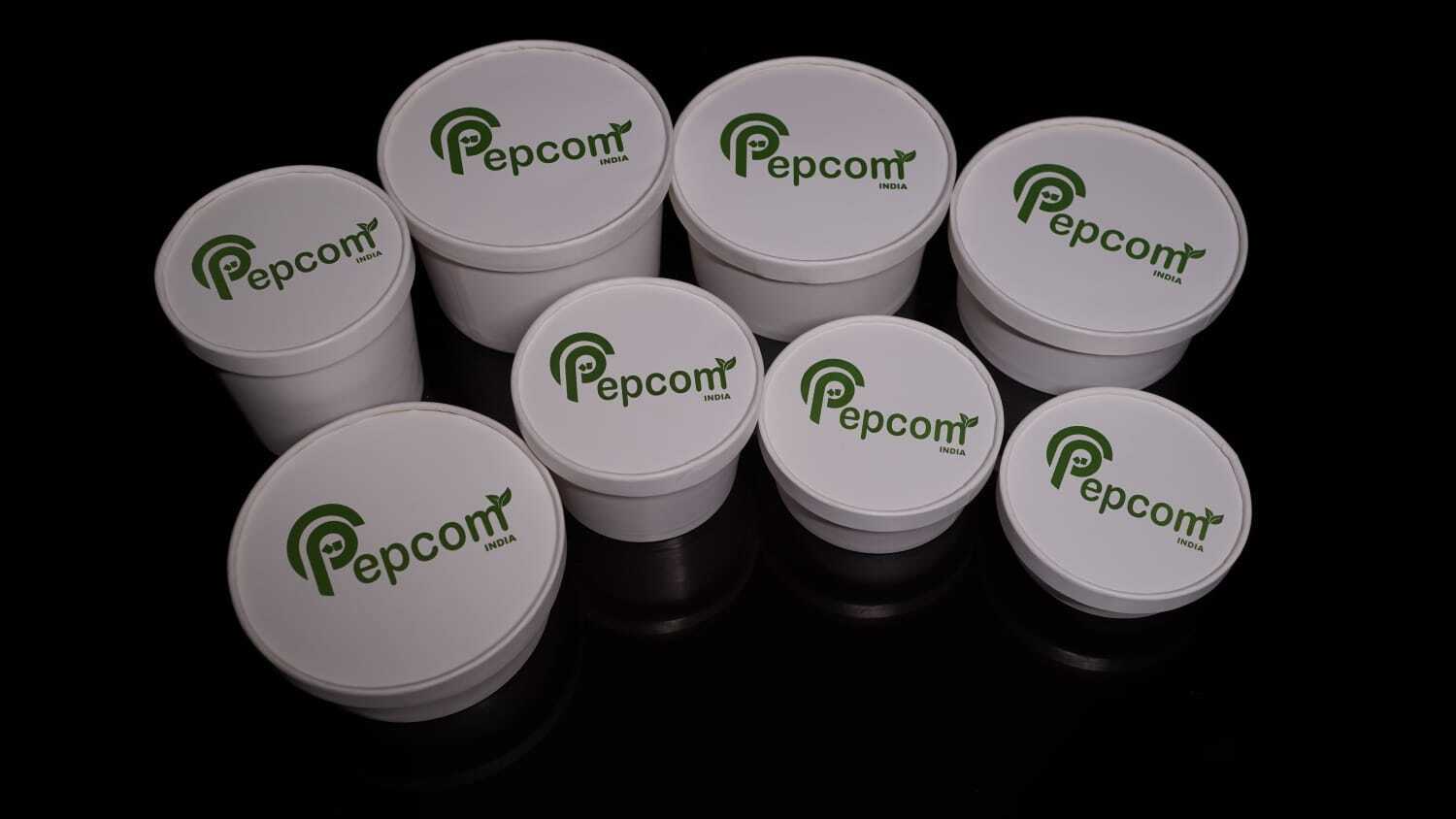 Pepcom India was launched in 2022, and the sales began in September 2023
Pepcom India was launched in 2022, and the sales began in September 2023
“During the pandemic, we saw a huge rise in demand for sustainable alternatives, especially in food packaging,” Sagnik tells The Better India. “But there weren’t many practical solutions available, and we saw an opportunity to step in and make a real impact.”
And so, in 2022, Pepcom India was born, an eco-friendly packaging company determined to offer a viable alternative to plastic in the food industry. The company began sales in September 2023 after studying the market thoroughly.
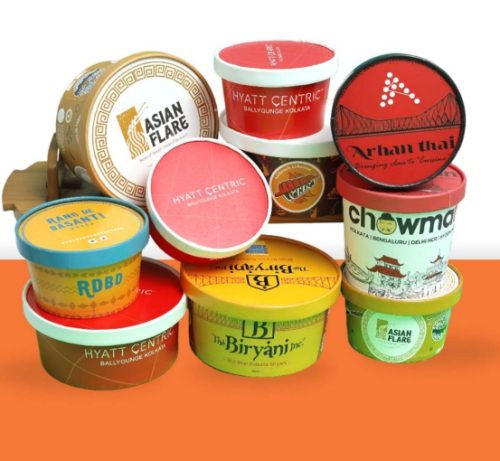 The food industry plays a huge part in aggravating the plastic problem, and Pepcom India decided to solve it by providing a suitable alternative
The food industry plays a huge part in aggravating the plastic problem, and Pepcom India decided to solve it by providing a suitable alternative
This deep dive also reinforced what the co-founders already suspected — that plastic’s dominance in food packaging, despite its convenience and affordability, came at an enormous environmental cost.
“Plastic releases harmful chemicals into food, especially when exposed to heat. It is also one of the largest contributors to the global plastic waste crisis. The food industry plays a huge part in aggravating the problem, and we decided to solve it by providing a suitable alternative,” explains Sagnik.
Turning vision into reality: From paperboard to packaging
The process of turning this vision into reality begins with sourcing high-quality raw materials. Pepcom uses high-quality paperboard sourced from ITC. Unlike cheaper alternatives that can warp or tear under heat and moisture, ITC’s paperboard is strong and durable, making it ideal for food packaging.
“We spent a lot of time researching suppliers before we found ITC,” Sagnik shares. “Their paper is perfect for our needs and can contain hot food, in its exact composition, for long hours. That was important for us from the very beginning.”
Once the paperboard arrives, the process of turning it into packaging begins. The first step is printing the containers with food-safe inks, making sure that each product meets health and safety standards. This is done using a printing press, which applies logos and branding where needed, followed by a punching process. The paperboard is then fed into a machine, which carefully shapes the paper into the desired form. Whether it is a bowl or a lid, each piece is precisely cut and made ready for folding.
Then, it goes through a folder-gluer machine, which folds and seals the containers into their final form. The process guarantees that each container is sturdy enough to handle hot, greasy, or wet food without falling apart.
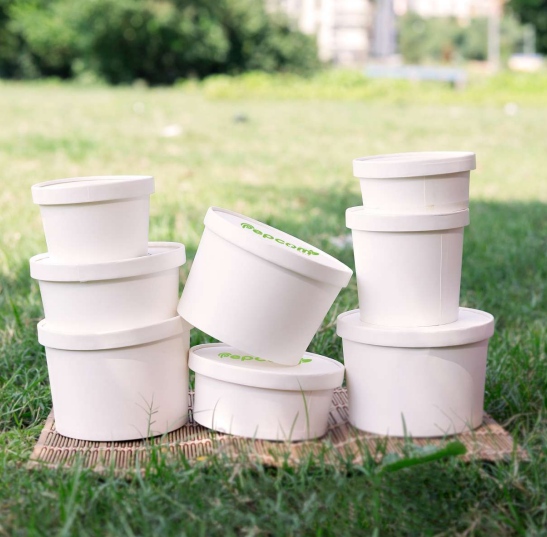 The paper containers undergo rigorous quality checks before they are sent out to customers
The paper containers undergo rigorous quality checks before they are sent out to customers
“The quality of the paperboard is essential. Our containers need to hold up all kinds of food, whether it is a steaming hot curry or a crisp pizza. That is why we have worked so hard to perfect our process,” says Sanjoy.
Before they can be sent out to customers, the containers undergo rigorous quality checks. They are tested for durability by storing food in them for hours, heating them in microwaves, and ensuring they do not leak or deform. Only containers that pass these tests are approved for use.
Apart from sourcing the paperboard responsibly, the finished containers are also FDA-approved for food safety. They are completely compostable and recyclable, reducing their impact on plastic pollution.
“We also hold ISO 9001 and ISO 22000 certifications for our packaging, which prove that our products meet the highest standards for safety in the food industry. We have obtained all the relevant certifications from ITC. Our paperboard is FSC certified, which guarantees that the raw material is harvested sustainably and preserves the environment,” explains Sanjoy.
Replacing six million plastic containers
To date, the brand has already replaced over six million plastic containers with paper alternatives, preventing 200 tonnes of plastic from entering landfills and avoiding 300 tonnes of CO2 emissions.
“It is a small dent in a massive problem. But I am glad we started this. Each container we produce is one less piece of plastic in the environment,” Sagnik says proudly.
Though a newcomer, the startup has already seen impressive growth. “We studied the market trends and compared the cost of plastic and sustainable packaging before deciding on our price. Currently, our prices are approximately 10 percent higher than traditional plastic packaging. For instance, a 500 ml container is priced at Rs 5.40, and a 750 ml container is Rs 6.25, with branding costs additional,” Sagnik adds
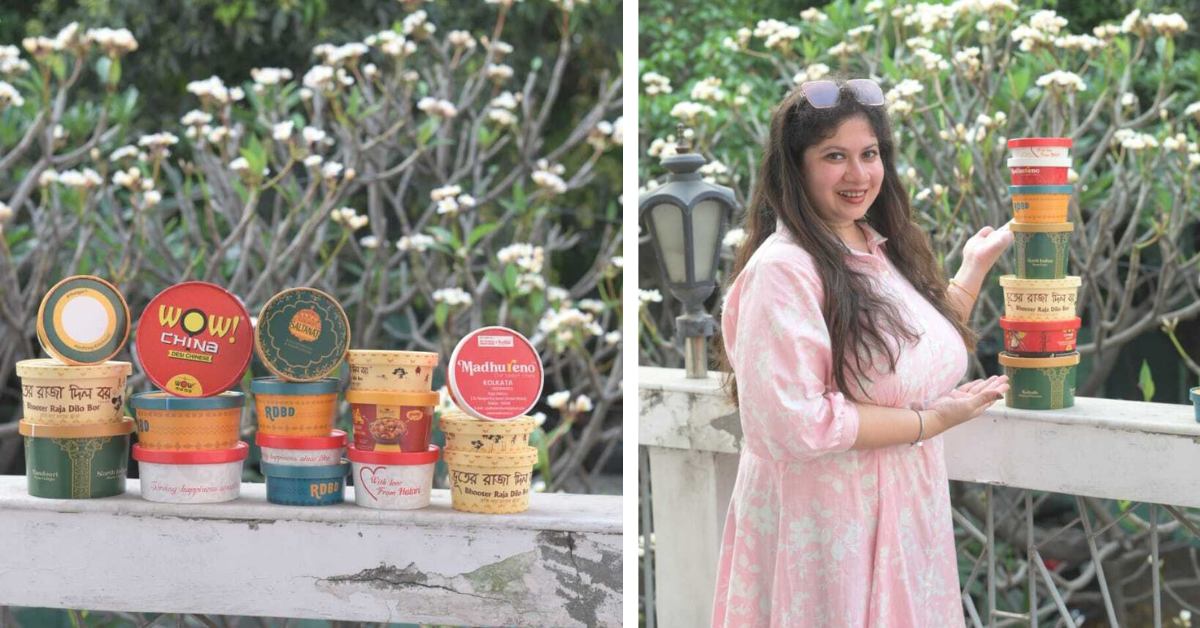 Pepcom India has replaced over six million plastic containers with paper alternatives
Pepcom India has replaced over six million plastic containers with paper alternatives
With Rs 2 crore in revenue over the past 15 months and Rs 15 lakh in monthly recurring revenue, the company has successfully gained the trust of over 70 restaurants nationwide, including well-known names like Wow China, Rang De Basanti Dhaba, and Shanghai in Kolkata.
In addition to Kolkata, their packaging solutions have reached major cities across India, including Bengaluru, Delhi, Mumbai, Pune, Chennai, and the state of Gujarat. Their pan-India presence includes partnerships with well-known food brands like Biryani By Kilo, EasyBites in Bengaluru, Tamari in Mumbai, and Gajanand Pauva House in Gujarat.
“We have had a great response from restaurants, especially as more customers demand sustainable practices,” says Sanjoy.
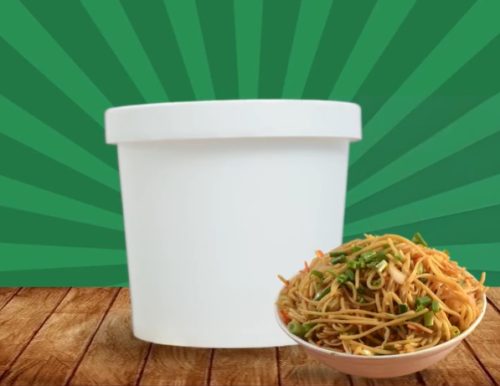 Pepcom India has introduced a subscription-based scheme designed for small food businesses
Pepcom India has introduced a subscription-based scheme designed for small food businesses
Rang De Basanti Dhaba has been purchasing paper packaging from Pepcom since 2024. “Shifting from traditional packaging to sustainable paper options was an important decision for us as we were looking for solutions to reduce our environmental impact. Paper packaging is biodegradable and recyclable, which helps us minimise plastic waste and align with growing consumer demand for eco-friendly products,” says Abhimanyu Maheshwari, founder of the restaurant chain.
“With increasing regulations around plastic usage, it felt like the right time to make the change. Pepcom’s commitment to quality and transparency has helped us switch to paper packaging easily. We do not have to worry about the boxes not staying in shape or the food getting spoiled,” he adds.
Making paper packaging accessible to all
One of the main challenges, however, is access. Many restaurants, particularly smaller ones, remain hesitant to switch simply because dependable alternatives are not easy to find. “The real hurdle right now is availability,” Sagnik explains. “Once we are sure that paper options are readily available for both small-scale and large-scale food industries, we can drive the shift quickly.”
To address this, Sanjoy says they introduced a subscription-based scheme designed for small food businesses. It allows them to order a minimum of 1,000 containers each month, which makes the transition to sustainable packaging more feasible. “This approach helps us meet their needs while also promoting the widespread adoption of paper packaging,” he adds.
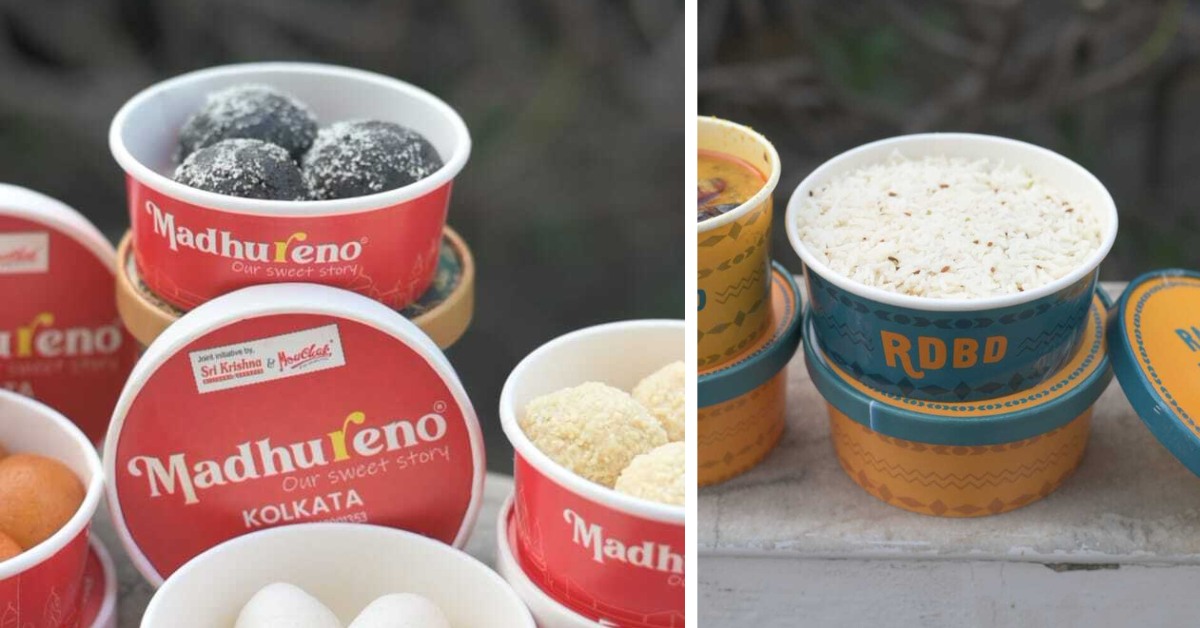 The founders of Pepcom India are focusing on building the brand’s name across India
The founders of Pepcom India are focusing on building the brand’s name across India
Convincing restaurant owners to switch from plastic to paper has not been easy. As Sagnik points out, “Plastic has been the standard for so long that changing people’s minds takes time.” But growing environmental awareness, he notes, is helping more businesses realise the need for sustainable alternatives.
He adds that while their long-term vision is to take Pepcom India global, their current focus is on expanding nationally. “India is home to around 80 lakh restaurants, and we see this as a huge opportunity to replace plastic containers with eco-friendly paper packaging,” he says.
Edited by Khushi Arora; All pictures courtesy Sagnik Mukherjee
News